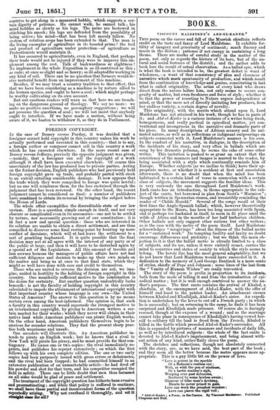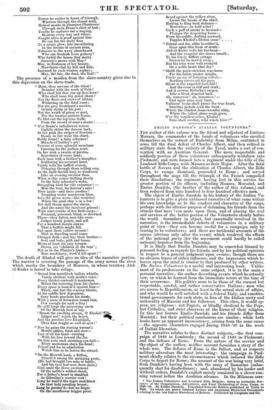BO 0 KS.
VISCOUNT MAIDSTONE'S ADD-EL-KADEB...
This poem on the career and fall of the Moorish chieftain reflects credit on the taste and fancy of Lord Maidstone. It exhibits fer- tility of imagery and generosity of sentiment; much fluency and music in the diction ; patience if not energy in sustaining a long theme. There are marks of careful study in the matter of the poem, not only as regards the history of its hero, but of the na- tural and social features of the district ; and the author adds to book lore the result of actual observation. As a ballad epic, which is what the book is intended to be, the greatest defect is want of wholeness,—a want of that consistency of plan and closeness of narrative which mark spontaneity of production, and which result from the combination of knowledge and genius, constituting in fact what is called originality. The artist of every kind who draws direct from the nature before hire, not only seems to secure con- gruity of matter, but even freshness and force of style ; whether it be that the power of resorting to Nature argues independence of mind, or that the mere act of directly imitating her produces, from her endless variety, a certain degree of novelty. This originality, with the merits which attend upon it, Lord Maidstone has not attained in his work, though he has in parts of it; and Abd-el-Suder is a curious instance of a writer being fresh, homogeneous, and really poetical in episodical matter, yet con- ventional and incongruous in the narrative and dramatic parts of his piece. In many descriptions of African scenery and its ani- mated nature, as well as in reflections or indignant outpourings on subjects connected with it, Lord Maidstone's manner is his own. In the conduct of his narrative, in dialogue, in the description of the incidents of his story, and very often in ballads which are sung by his dramatis person, he seems the echo of some other writer. This imitation is pushed to so great an extent that the consistency of the manners and images is marred to the reader, by being associated with a style which continually reminds him of Europe. "Whether subjects (as we incline to think) have their ap- propriate metre, or whether it is accident at first and association afterwards, there is no doubt that when the mind has been habituated to a certain kind of verse in connexion with a certain class of subjects, the movement suggests the familiar ideas. This is very curiously the case throughout Lord Maidstone's work. Each canto has an introduction, in theme appropriate to the sub- ject of the canto, but borrowed in plan from Scott's " Marmion "; though written in Spenserian stanza, and irresistibly reminding the reader of " Childe Harold." Several of the songs recall at their first lines the Anglo-Spanish ballad; which, however theoretically appropriate to the Moors, has been too long associated with Spain, and is perhaps too haeknied in itself, to seem in fit place amid the wilds of Africa and in the mouths of her half barbarian children. Other ballads not only suggest other nations but other writers ; as is the case with the metre of the poem itself. Lord Maidstone acknowledges " misgivings " about the fitness of the ballad metre for a "sustained work." Its tempting facility and laxity no doubt encourage diffuseness and prolixity ; but we think the main ob- jection to it is that the ballad metre is already limited to a class of subjects, and its use, unless it were entirely recast, carries the mind to countries and states of society to which the style seems to belong. The heroic line has the most general adaptability, but we do not know that Lord Maidstone would have succeeded. in it. A dedication to the memory of Lord George Bentinck is a mere canto of styles, chiefly of Pope and Johnson ; some lines of the last from the "Vanity of Human Wishes" are really travestied.
The story of the poem is prolix in proportion to its incidents, both from the mode of telling it and from the introduction of epi- sodical matter ; but it is well enough contrived to answer the au- thor's purpose. The first canto contains the arrival of Khaled, a chieftain, at the encampment of Abd-el-Kader, with the offer of himself and band to the patriot leader. An attachment ensues between Khaled and Khadidjak, Ahd-el-liader's sister. An expedi- tion is undertaken by the lover to cut off a French party ; in which he is successful ; but on returning to the camp, he finds it has been surprised and Khadidjah made prisoner. Of course she is daringly rescued, though at the expense of a wound; and as the marriage cannot take place in consequence of Khadidjah's having vowed her- self to celibacy till the land is freed from the French, Khaled is killed in the battle which preceded AM-el-Kaden surrender. All this is expanded by pictures of manners and incidents of daily life, as well as by introduced subjects : the whole of the last canto is devoted to Abd-el-Kader's imprisonment, and being almost with- out action of any kind, rather flatly closes the poem.
The sketches and reflections, though not absolutely connected with the story, are, as we have said, the best part of the book ; and they seem all the better because the metre appears more ap- propriate. This is a gay little bit on the power of love.
"Love is potent in the sparkle Of a Bedouin's restless eye ; Writ, as with the pen of madness, Or a heetie maiden's sigh, Weeping over past delusions, Scattered by some lawless swain ; Glamour of false man's devising, Hearts he never prized to gain. Love can work the proudest wonders ; Love can pierce the rigid veil ;
• Abd-el-Kader ; a Poen], i i:Cantos. ByViocouatMai5stone. Published Chapman and Hall.
Dames he smites in hours of triumph, Warriors through the closest mail, Holiest monks in gloomiest Chartreuse Through stern Bruno's shirt of hair ; • Youths he captures out a maying, Maidens every way and where. Nought alive is proof against him: He can fan the dusty fires To a mimic glow, late smouldering In the breasts of ancient sires, Totterers to the wavy churchyard. Who can freakish Love gainsay ? Who forbid the banns that marry January's snows with May? May, in freshness of her beauty, Hawthorn-clad by hill and dale, Incensed by each wanton zephyr; May, the fair, the fond, the frail ! "
The presence of a maiden from the slave-country gives rise to this digression on the slave-trade.
"Ham thou servant of the vilest !
Branded with the mark of Cain!
Who shall bid thee rise up free-born ? Who shall loose thy penal chain ? Not the fleets and crews of Albion, Withering on thy fatal coast ; Not the grey lieutenant's service, Grimly.dying at his post ; Not the wrath of priest or poet, Nor the treaties nations frame, To blot out the lep'rous traffic
From the record of man's shame '
"O'er Benin's unhallowed waters Lightly skims the dmmon bark,
At her peak the stripes of freedom—
Steady in her wake the shark. Nobly found! a fairy schooner ! Miracle of builder's art ! . Venture of some splendid merchant Catering for the godless mart. On her deck a swarm of pirates, Reprobates of every land; Each man with a brother's slaughter Reddening his accursed hand. Vainly toils the baffled cruiser, Plunging through those rolling seas, As the light-heeled bark to windward Like an evening swallow flees. What is this comes drifting slowly In the fairy schooner's wake, Struggling hard for vile existence ? — Man the boat, for honour's sake ! Here again—and there another ! Dropping under murderous blow, ' Into the green wave—like wretches When the good ship 's in a low ! Yet dull Ocean spares the slaver, And she nears the et:so/vent ground ; With nine-tenths of her flesh-cargo- Frenzied, poisoned, blind, or drowned. There—they fatten men like oxen : Judges bandy points, and sell For a hundred ducats sinews That a buffalo might fell. Out upon these yellow tyrants ! That in drawling nasal tones
Cheapen flesh—and buy their brother—
Soul and body, pith and bones. Moors at least are easy tyrants : Slaves, are children of the tent' ; Not as in the Planter's limbo- . Base machinery, work'd till spent !"
The death of laded will give an idea of the narrative portion. The warrior is covering the passage of the army across the river which marks the boundary of Morocco, in whose territory Abd.- el-Nader is forced to take refuge.
• "Round him matchlock bullets whistle, Vainly strident with death's voice ; Every thicket-ambush'd marksman
Makes the towering form his choice ; Every spear is launch'd against him—
Thick, and fast the warrior bleeds; At his saddle-bow dependent, Gory heads proclaim his deeds: With a score of horsemen round him, Few enough for such a fray ! He still keeps the narrowing circle Of the Moorish host at bay. 'Breast the swelling stream, 0 Khaled
Linger not! rejoin the brave, And thy peerless love Khadidjak,
Thou haat fought so well to save ! '
"Now he gains the roaring torrent's Middle eddies, faint and slow— Last of all his band—retiring With his face toward the foe. On him rests each straining eye-ball- Every marksman stays his hand ; Friend and foe in admiration Watch him as lie leaves the strand.
"On the Moorish bank, a Ruffian, Crouch'd among the springing grain, (He had brought two sons to battle, And his eyes had seen them slain,) Cool amid the fierce excitement Of the melee's wildest shock, For a father's heart is steadfast As Gibraltar's warrior rock ! Long he traiil'd the taper matchlock On that bold receding breast ; Long he ponder'd—but no finger On the murderous trigger prest.
Broad against the yellow river, Looms the bosom of the chief, Halting to fling back defiance- Motionless—in bold relief!
Curls a puff of smoke to leeward—
Plunges the despairing horse— From his saddle, driftino. seaward, Topples Khaled's lifeless come "Friend and foe, alike bewilder'd,
Gaze upon this freak of death : Abd-el-Kader veils his forehead—
And the vengeful sire draws breath ; To his lonely Riffian cottage Sorrowful he turn'd away; But his sons were well avenged On a noble heart that day!
"Shrill the panic-stricken war-horse For his fallen master neighs,
Pricks an ear of listening velvet—
Bending river ward his gaze.
Silent is the expected foot-fall ! And the corse is stiff and stark ; And it crowns Melucha's surges, Like a black deserted bark.
Ah, tomorrow ! ah, tomorrow ! —
Cast upon some oozy bank,
Vultures' beaks shall pierce the true heart, Snarling jackals rend the flank.
Where the cbiefest foam-wreaths eddy, Where the tallest slime-reeds grow, O'er thy tombless relics, }Dialed! Suns shall swelter, wild winds blow !"



























 Previous page
Previous page